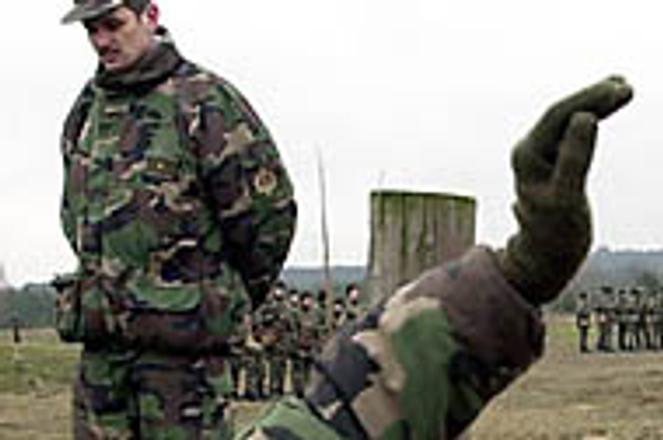Army exercises in Kuchyňa. While poor training has been faulted by NATO, overstaffing is a greater problem.photo: TASR
Reform of Slovakia's armed forces is pitting the economic concerns of local governments, where army bases are closing, against the NATO integration ambitions of the state. While the latter says it sympathises with the lost revenue army cuts may represent, state officials argue that army reform is too important a process to be derailed by "minor" worries.
In order to become a NATO member as it hopes during the Alliance's possible 2002 expansion, Slovakia must make significant cuts to its total number of soldiers, and increase the ratio of professional soldiers to conscripts in order to acquire the small, mobile fighting force demanded of NATO applicants.
The reform - which began after Czechoslovakia was split into two states during the 1993 Velvet Divorce - may boost the country's NATO ambitions, but it comes at a price. Thirteen army bases have been shut down across Slovakia since the end of 1998, leaving towns which had formerly housed the bases complaining of damage to local economies and the lost social status they had enjoyed with the bases.
"The Senica army base had an average annual budget of some 60 million Slovak crowns ($1.25 million), and a considerable part of that money naturally went to local retail and wholesale shops," said Ľubomír Parízek, mayor of Senica, a town of 21,000 in western Slovakia. Last year, half of the soldiers in the town's base were moved out, with complete closure scheduled for some time this year.
"Although the closure won't significantly increase regional unemployment [approximately 50 Senica inhabitants work at the army base today; Senica has an unemployment rate of 14.5% - ed. note], the cash flow in Senica will certainly be affected by the retreat of the local army base," he added.
But Parízek's complaints have moved neither military analysts nor the Defence Ministry, who say the economic impact on villages should not interfere with a reform so key to the country's western integration efforts.
"Army reform can't be stopped now just because of some minor complaints," said Alexander Duleba, head of the Prešov branch of the Slovak Foreign Policy Association (SFPA) think tank. "Too much is at stake."
The ministry agreed, saying that the existing army was too large and inefficient. "Slovakia can't afford to finance an unnecessarily big and ineffective army, like the one we have now," said Deputy Defence Minister Rastislav Káčer. "Cuts must be made."
The current annual budget for the Slovak Army is 18 billion crowns (1.89% of gross domestic product), a level the government has pledged to maintain for the next five years. Káčer says that sum cannot properly fund the army in its current "inflated" size.
"By cutting back, we can better 'feed' the army and thus make it more efficient," he said.
Cut-backs
The Defence Ministry has set itself the goal of lowering the number of soldiers to 30,000, down from 47,000 in 1993. To increase efficiency, the ministry plans to raise the percentage of professional soldiers from today's 42% to almost 70% by the end of 2001.
Further changes have included allowing army conscripts to do public service at hospitals or Defence Ministry headquarters instead of serving in the ranks. The mandatory service of conscripts was shortened to nine months in 2000, down from two years in 1989. Slovak men are still subject to army service from the age of 18.
While NATO and Ministry officials may be pleased with the moves, affected town leaders say they regret the shift in strategy.
"The presence of an army guarantees that a certain amount of money will be spent in that area, and it also raises the social prestige of a town," said Pavol Segeš, mayor of the western Slovak city of Topoľčany (30,000), which last year saw the number of soldiers at its army base cut in half. "Of course we regret the fact that the army must leave."
But the SFPA's Duleba said that the mayor would simply have to bear the burden for the sake of the country's overall welfare. "These mayors must have the same priorities as the country's leaders," he said. "Reform of the army is necessary, and if we manage to become NATO members, a positive economic impact [through foreign investment] would likely follow. That will benefit the whole country."
Káčer added: "Army reform is inevitable. The army must be reformed because it's ineffective. Moreover, the reform is a part of our NATO integration ambitions.
"Although we understand that closing army bases may have short-term negative economic results for some villages, propping up inefficient and unnecessary bases would waste the whole country's money," he continued.
"We can't justify this."


